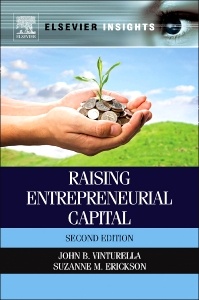Raising Entrepreneurial Capital (2nd Ed.)
Auteurs : Vinturella John B., Erickson Suzanne M.

Raising Entrepreneurial Capital guides the reader through the stages of successfully financing a business. The book proceeds from a basic level of business knowledge, assuming that the reader understands simple financial statements, has selected a specific business, and knows how to write a business plan. It provides a broad summary of the subjects that people typically research, such as "How should your company position itself to attract private equity investment?" and "What steps can you take to improve your company's marketability?"
Much has changed since the book was first published, and this second edition places effects of the global recession in the context of entrepreneurship, including the debt vs. equity decision, the options available to smaller businesses, and the considerations that lead to rapid growth, including venture capital, IPOs, angels, and incubators. Unlike other books of the genre, Raising Entrepreneurial Capital includes several chapters on worldwide variations in forms and availability of pre-seed capital, incubators, and the business plans they create, with case studies from Europe, Latin America, and the Pacific Rim.
Chapter 1 Introduction Chapter 2 Alternatives in Venture Financing—Debt Capital Chapter 3 Alternatives in Venture Financing—Early Stage Equity Capital Chapter 4 Determining the Amount Needed—The Business Plan Chapter 5 Valuation—Survey of Methods Chapter 6 Venture Capital Chapter 7 Exit StrategiesChapter 8 Anatomy of a Venture Funding Chapter 9 Franchising Chapter 10 Internal Financial Management Chapter 11 Essentials of Risk Management Chapter 12 Opportunities to Do Business and Raise Capital Globally
Students in entrepreneurship programs, particularly entrepreneurial finance courses, entrepreneur firms, and independent entrepreneurs
Dr. Suzanne Erickson received her PhD in Finance from the University of Washington. She taught at Seattle University for several years where she was instrumental in starting the Entrepreneurship Center. Currently she is the Associate Dean in the College of Business and Mass Communication at Brenau University in Gainesville GA. Her areas of expertise are Corporate Finance, Valuation and Entrepreneurial Finance. In addition to publishing several articles in the areas of corporate finance and Raising Entrepreneurial Capital, a text coauthored with John Vinturella, she has consulted with several start-ups, Fortune 500 companies and non-profits.
To read the author's blog, visit http://scitechconnect.elsevier.com/category/economics-finance/
- Combines solid theory with a practitioner's experience and insights
- Case studies illustrate theory throughout the book
- Updated to reflect the realities of the global economic recession
Date de parution : 01-2013
Ouvrage de 360 p.
15x22.8 cm
Retiré de la vente
Thèmes de Raising Entrepreneurial Capital :
Mots-clés :
5 Cs; Accredited investor; Agent versus reseller; Angel investor; Arm's length; Asset-based financing; Asset-based valuation; Average collection period (ACP); Bootstrapping; Business format franchise; C-corporation; Capitalization; Capitalization rate; Capitalization table; Carried interest; Cash budget; Cash conversion cycle (CCC); Competitive advantage; Contingent liability; Conversion franchise; Corporate venture capital; Cost of capital; Days payables outstanding (DPO); Direct public offering; Doing business internationally; Due diligence; ESOP; Earn-out; Earnings multiples; Entrepreneur; Exit strategy; Factoring; Financial risk; Fractional entrepreneurship; Franchise agreement; Franchise disclosure document (FDD); Franchise fees; Franchisee; Franchisor; Free cash flow; Global mind-set; Initial public offering (IPO); Initial public offerings; Intellectual property; International business partners; International stock exchanges; Inventory conversion period (ICP); Investment proposal; Knowledge assets; Legal and regulatory issues; Leverage buyout; Line of credit; Line of credit (LOC); Liquidity event; Loan guarantee; Loan guarantee programs; Market multiple; Nonbank lenders; Operational risk; Partnership; Personal collateral; Pledging; Postmoney valuation; Private equity; Pro forma; Pro forma financial statements; Product/trade name franchise; Pure risk; Raising capital internationally; Regional considerations; Revenue-based financing; Reverse merger; Risk control; Royalties; Sole proprietorship; Speculative risk; Stages of growth; Statement of cash flows; Strategic risk; Term sheet; Term sheets; Testing international markets; Trade credit; Underwriter; Venture banking; Venture capital; Weighted average cost of capital; Working capital management



